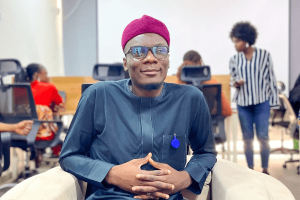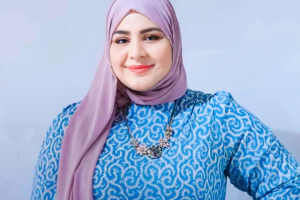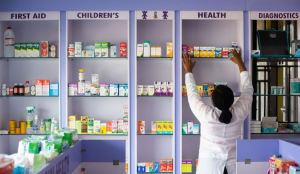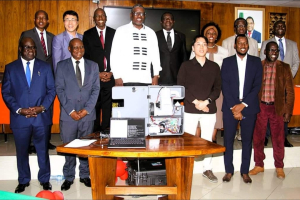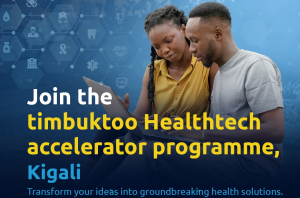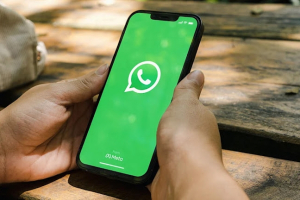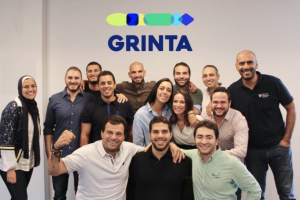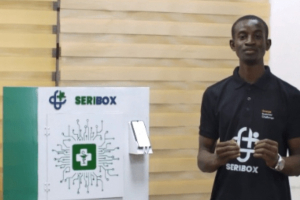Abdulkadir Suleiman Lapai Champions Wider Access to Digital and Healthcare Services
Abdulkadir Suleiman Lapai builds and leads several tech companies in Nigeria. He creates digital tools that improve how schools and healthcare centers operate, always focusing on local needs.
A Nigerian software engineer and entrepreneur, Lapai plays a key role in growing his country’s tech sector. He leads Tespire, a company he founded to expand digital access in education and healthcare.
Lapai and Umar Madugu started Tespire in 2022. The company equips private Nigerian schools with internet, tablets, and management software. Tespire aims to modernize education and cut financial losses caused by poor tuition fee management. Its platform speeds up payment collection, improves communication between schools and parents, and boosts administrative transparency.
Tespire says it has generated over $12 million in revenue for partner schools and improved their administrative efficiency by 80%. In May 2025, Alternative Bank funded Tespire’s new health research program, Asibiti. Asibiti builds tools for hospital management and medical data handling. Its first product, the Asibiti box, connects patient data in one place and helps track care. Hospitals in Niger State tested it, and the company plans to expand to private clinics.
Lapai also founded JD Lab, a tech firm that supports projects solving Africa’s unique challenges with emerging technologies. He co-founded Labspace Nigeria, an innovation hub offering shared workspaces and backing sustainable growth projects.
He consults for Nigeria’s Ministry of Science and Technology and leads the IT team for TEDxMinna, a platform for spreading fresh ideas.
Lapai earned a bachelor’s degree in computer science from Ibrahim Badamasi Babangida University in 2011. He completed a master’s in finance and investment at Ahmadu Bello University in 2019. He started his career in 2012 as a research assistant at the Federal Agency for Science & Technology.
From 2014 to 2016, he worked as a software engineer. In 2017, he became special assistant to the governor of Niger State. There, he oversaw the development of a management system for the State’s Career Information and Resource Center (NSCIRC).
Melchior Koba
Abid Khouloud Leverages AI for Personalized Child Mental Health
She is committed to providing tailored support for mental health, particularly for people with neurodevelopmental disorders. Her innovative approach has earned her several awards.
Abid Khouloud, a Tunisian entrepreneur and ardent mental health advocate, is the co-founder and chief executive officer of AUZY Mental Health, a startup leveraging artificial intelligence to transform mental healthcare.
Founded in 2021, AUZY Mental Health is a medical technology startup providing a comprehensive medico-psycho-social support platform. This platform offers tailored care for children with neurological development disorders, encompassing information, detection, diagnosis, treatment, and support services.
AUZY aims to provide access to expert therapists and facilitate early screening. The company's core mission is to empower every child to become an active member of society and benefit from all means of decent living. We work to ensure guidance, coordination, and an early intervention process for children with neurodevelopmental disorders.
Prior to establishing AUZY, Khouloud co-founded Elfallega in 2020, a company specializing in outdoor activities for individuals and professionals. She served as the communications manager there until 2023.
Khouloud earned a computer engineering degree in 2023 from the Higher Institute of Computer Science and Communication Technologies (ISITCom) in Tunisia. She also holds a master’s degree in systems, services, and applications in the Internet of Things from the National School of Engineers of Sousse, obtained in 2020.
Her professional journey began in 2020 as a full-stack engineer for the Rassemblement des ingénieurs francophones (RIF) in France. In 2022, she joined Bigweb Agency, a digital marketing firm, where she was responsible for the program management office.
Khouloud is a recipient of the Orange Social Venture Prize in Africa and the Middle East (POESAM) 2024 in Tunisia. Her startup also secured third place in the Tunisia E-Health Valley competition, which recognizes companies offering digital solutions for the pharmaceutical, health, and wellness sectors.
By Melchior Koba,
Editing by Sèna D. B. de Sodji
Field Gets $11M from Gates Foundation For Maternal, Child Health in Africa
African healthtech company Field has introduced a new route-to-market service to address maternal mortality, newborn health, and nutrition. Announced on September 11, the launch is backed by an initial $11 million investment from the Bill & Melinda Gates Foundation.
The initiative will use Field’s technology, distribution network, and financing services to deliver emerging therapies across Kenya and Nigeria.
It will focus on digitalizing healthcare operations and enhancing supply chains, including financing options, last-mile delivery, and installing pharma-grade refrigerators.
Zambia Launches Digital Health Systems to Improve Healthcare
Digital transformation, particularly in healthcare, is crucial for development. Implementing Digital Health Systems is expected to improve access to medical care and reduce inefficiencies. By tracking pharmaceuticals using digital tools and AI, the government can better manage resources and ensure that essential medicines reach patients, thereby improving public health outcomes.
Zambia has begun rolling out Digital Health Systems in hospitals nationwide to enhance healthcare delivery and ensure the availability of essential medicines. The project was announced on September 4 by the Ministry of Science and Technology. In collaboration with the Ministry of Health, it aims to digitize healthcare services and combat drug pilferage.
At the launch of the project in Gwembe, Southern Province, Minister of Science and Technology Felix Mutati highlighted the role of modern technology in transforming healthcare. He noted that hospitals would now use digital tools to extend healthcare access to more Zambians. Additionally, the system will track pharmaceuticals from procurement to patient use, aiming to curb drug theft in healthcare facilities.
Access to basic healthcare services in Zambia is unevenly distributed between provinces and between urban and rural areas. According to the International Insulin Foundation report on Zambia’s Health System, in urban regions, 99% of households are located within 5 kilometers of a health facility, whereas in rural areas, only about 50% of households have similar proximity to healthcare facilities. The digitization initiative aims to bridge this gap by utilizing digital tools to reach more citizens, especially in underserved rural regions
Meanwhile, drug theft has been a longstanding issue in the Zambian health sector whose national drug stock level was 53.1%, below the World Health Organization’s minimum threshold of 70%. Transparency International highlighted the concerns in 2020 when Zambian journalists uncovered irregularities in a US$17 million health kit procurement. By digitizing health services and leveraging AI technologies, the government improves accountability in the pharmaceutical supply chain, ensuring drugs are tracked from procurement to patient use, ultimately boosting transparency and curbing mismanagement.
This move aligns with Zambia’s ‘Health Information Systems Strategy 2022 – 2026’ vision of “a national health information system that harnesses digital innovations to support evidence-based decision making for quality and equitable health services.”
Hikmatu Bilali
University of Zambia Partners with South Korea to Fight Malaria with AI
Malaria remains one of Africa’s most pressing public health issues, accounting for over 90% of global malaria cases and deaths. Leveraging AI to enhance prevention, detection, and treatment can drastically reduce the disease’s burden, saving lives and improving health outcomes.
The University of Zambia (UNZA) and the Convergence Research Centre for Insect Vectors (CRCIV) of South Korea have signed an agreement to advance malaria research using artificial intelligence (AI). The partnership, signed on August 30, will establish a Research Center of Excellence at UNZA’s School of Engineering, focusing on preventing malaria outbreaks through AI technology.
For UNZA Acting Vice Chancellor, Professor Bornface Namangala, the partnership marks the beginning of a transformative effort to tackle malaria, a leading cause of death in Zambia.
SMART Zambia National Coordinator, Percy Chinyama, praised the collaboration, noting that the center could serve as a learning platform and help institutionalize AI in Zambia.
The initiative will leverage cutting-edge AI technology to identify mosquito species and combat malaria. An AI-powered system will be deployed to collect and accurately classify mosquito species, enhancing the precision of malaria prevention efforts. This project has garnered strong support from the government.
According to the U.S. President’s Malaria Initiative (PMI), which aids sub-Saharan African countries in controlling and eliminating malaria, Zambia remains highly endemic, with the entire population at risk. In 2022, the National Malaria Elimination Centre (NMEC) reported over 8.4 million cases, an incidence rate of 428 per 1,000 people annually, and 1,337 malaria-related deaths, equating to 8 deaths per 100,000 people.
This initiative aligns with Zambia’s National Malaria Monitoring and Evaluation (M&E) Plan 2022-2026, which outlines a framework for tracking malaria program indicators, data sources, analysis, information flow, reporting, and feedback for informed decision-making. It directly supports the plan’s goal of improving data-driven decision-making and achieving better health outcomes.
Hikmatu Bilali
UNDP and Timbuktoo Launch Pan-African HealthTech Accelerator
The United Nations Development Program (UNDP) and Timbuktoo Africa Innovation Foundation have launched the HealthTech Startup Accelerator Program, a Pan-African initiative focused on transforming healthcare across the continent. Hosted at the HealthTech Hub in Kigali, Rwanda, the program aims to empower startups to develop innovative health technologies that address Africa's critical healthcare challenges.
The accelerator offers early-stage startups mentorship, funding, and access to advanced resources. Applications are open to African-owned startups with founders aged 18 to 35, who have a minimum viable product in sectors like telemedicine, healthcare logistics, diagnostics, and mobile health. Interested startups must apply by October 6, 2024.
Gupshup, Meta, Partners Launch Telemedicine Chatbot for Sudanese Refugees
Tackling healthcare disparities intensified by conflict and displacement is crucial for building long-term resilience and self-sufficiency among refugees. Utilizing advanced technology allows for the provision of immediate medical aid, enhancing healthcare accessibility a vital element in the broader framework of African development and stability.
U.S. messaging platform Gupshup, Meta (formerly Facebook), the Sudan Medical Specialization Board, and Shabaka, a consulting and research organization dedicated to humanitarian issues, have jointly launched a telemedicine chatbot. The initiative, announced by Gupshup on July 3, aims to deliver medical assistance to Sudanese refugees.
“We are honored to be part of this humanitarian project that aims to provide essential healthcare services to Sudanese refugees in need. By leveraging the power of conversational AI and the reach of WhatsApp, we can make a significant impact on the lives of these individuals who have faced immense challenges,” said Beerud Sheth, Founder & CEO of Gupshup.
The chatbot, accessible via WhatsApp, targets refugees in Egypt, Eritrea, Saudi Arabia, Libya, Djibouti, and other neighboring countries. The telemedicine service offers a secure, regulatory-compliant platform supporting Arabic and English, with additional languages planned.
According to Gupshup, the project aims to meet the urgent healthcare needs of about 800,000 Sudanese refugees with limited access to medical services. The chatbot allows patients to connect with healthcare providers, who then route them to a triage team for assessment before linking them to one of over 18 specialty doctors.
The United Nations High Commissioner for Refugees (UNHCR) reveals that the ongoing conflict has left nearly 25 million people in Sudan in need of humanitarian assistance, with severe shortages of food, water, medicine, and fuel affecting millions. This underscores the importance of scalable, tech-driven solutions in humanitarian aid efforts to support vulnerable populations in crises effectively.
Hikmatu Bilali
Egypt: Grinta Modernizes Pharmaceutical Supply Chain with Web and Mobile Platforms
The solution, launched by several tech entrepreneurs, aims to revolutionize the pharmaceutical supply chain. It is growing fast and intends to expand to several countries in Africa.
Egyptian startup Grinta has developed an e-health solution that allows pharmacies to replenish their medicine stocks via its web and mobile platforms. Founded in 2022 by Hamza Tag, Yosra Badr, Mohamed Azab, and Ali Youssef, the Cairo-based startup aims to become Africa’s leading wholesale platform for medicines, cosmetics, and medical supplies, serving as the primary intermediary between pharmaceutical laboratories and pharmacies.
To achieve its ambitions, Grinta has made several acquisitions of companies operating in its sector. Last August, it acquired Auto Cure, a business-to-business e-commerce platform serving independent pharmacists in Alexandria, bolstering its growth in this region. “The acquisition of Auto Cure underscores Grinta’s commitment to delivering value to its customers and expanding its presence in the Egyptian market,” said Mohamed Azab.
Grinta’s mobile application, available on iOS and Android, requires pharmacies to create an account to access its supply chain. They can replenish their supplies via digital distributors, manage their stocks and sales, access educational content, and arrange financing or loans. “We empower our customers to purchase the pharmaceuticals and supplies they need and provide them with tools to manage their working capital and inventory through an easy-to-use and inclusive platform, enabling them to prioritize patient care,” the startup explains.
Beyond Egypt, the e-health platform, which claims to have served over 7,000 pharmacies and delivered more than 200,000 orders by August 2023, is also operational in Tanzania. With ambitions for expansion, the Android version of its mobile application has been downloaded more than 10,000 times, according to the Play Store.
Adoni Conrad Quenum
Guinea: Seribox Revolutionizes Medicine Access with AI and Local Language Support
The solution was set up by young tech entrepreneurs to make it easier for people to buy medicines in local languages. It won first prize at the 2023 Orange Summer Challenge.
Seribox, an e-health solution developed by the Sily Group, leverages artificial intelligence and the Internet of Things to enable users to acquire medicines in local languages. The group, led by Youssouf Djafara Diallo, initially showcased its solution at the 2023 Orange Summer Challenge. This competition, organized by telecom operator Orange, assembled students from diverse universities across 15 countries in Africa and the Middle East.
Seribox operates as a medicine dispenser that can be procured via a smartphone functioning as an order terminal. Users simply press the microphone icon button, akin to creating a voice note on an instant messaging application, to place an order in their chosen local language. In a demonstration video, Diallo placed orders in Sousou and Peulh, two local languages prevalent in Guinea.
The system responds in the order’s language, ensuring to repeat the ordered medicine’s name and its price. It automatically shifts the order to the shopping basket, with the option to add more orders to the basket. Upon completion of this stage, users validate the order by pressing the corresponding green button. The terminal then displays a QR code, allowing the bill to be paid via the Orange Money application. Once payment is confirmed, the dispenser releases the ordered medicines for the user to collect without any issues.
It’s important to note that Seribox does not dispense medicines that require a doctor’s prescription. Doctors must log into a dedicated platform to prescribe drugs that can be utilized on Seribox. They can prescribe up to four drugs per prescription, and upon doing so, the system generates a QR code. Users can photograph the prescription or have it printed on paper to place their order with Seribox. An order can also be canceled by sending a voice message to the device.
Adoni Conrad Quenum
Congo: AfriWell Health Connects Patients to Doctors via Web and Mobile Platforms
The e-health solution was established by a former banker, who ventured into entrepreneurship driven by her desire to transform telemedicine in Central Africa.
AfriWell Health, a Congolese healthtech startup, offers a platform for patients to connect with healthcare professionals for treatment. Founded in 2022 by Joelle Itoua Owona and based in Pointe-Noire, the startup secured an undisclosed funding from Google for Startups in March 2023 to bolster its growth.
The company’s solution, an Android-exclusive mobile application, allows users to register with their personal details and access a variety of healthtech services, including online appointments with general practitioners and specialists.
Since AfriWell Health has doctors worldwide, consultations are mainly carried out online. Owona’s goal with her healthtech solution is to address the doctor shortage in Africa, particularly in Congo. The platform maintains a digital medical record for each patient, providing doctors with a comprehensive view of their medical history.
The startup also facilitates healthcare provision for the Congolese diaspora to their relatives back home. Additionally, AfriWell Health provides a weekly updated list of on-duty pharmacies in Pointe-Noire, streamlining the medicine purchasing process for patients.
Adoni Conrad Quenum


